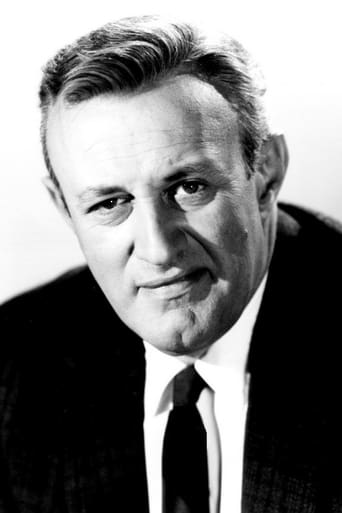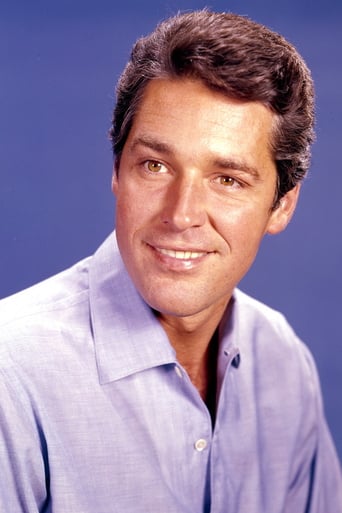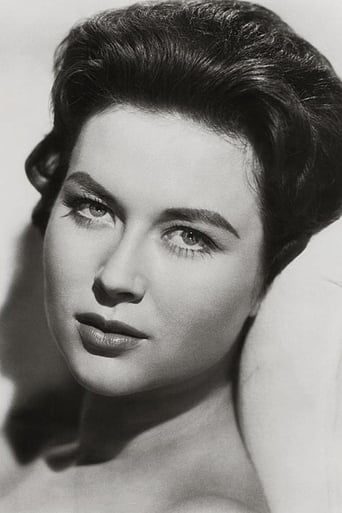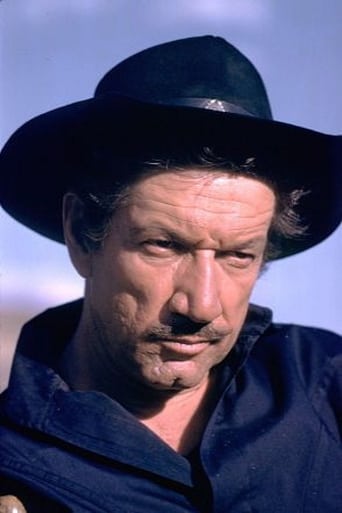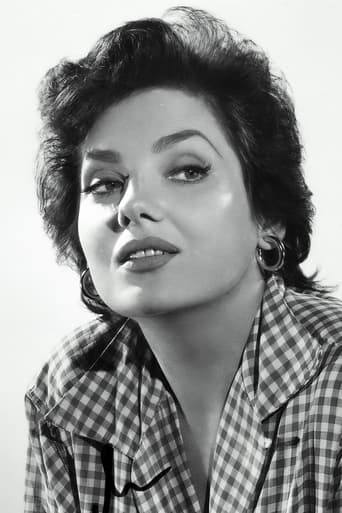KnotMissPriceless
Why so much hype?
BootDigest
Such a frustrating disappointment
Listonixio
Fresh and Exciting
Scarlet
The film never slows down or bores, plunging from one harrowing sequence to the next.
dougdoepke
No need to recap the plot. Those who compare this racketeering movie with The Phenix City Story (1955) are making an apt comparison. The problem for this film, unlike Karlson's, is that The Garment Jungle has too many flaws to succeed as a minor gem. At its core, it's a good gritty film with a gutsy screenplay and a powerhouse selection of featured players. But, the end result is compromised by two key flaws. No matter how you cut it, Kerwin Mathews is simply not up to the challenge of his pivotal role as the conscionable son. Unlike Richard Kiley of Phenix Story who must go through similar changes, Mathew's bland demeanor remains the same even after he's committed to fighting corruption and his father. He has basically one emotionless expression for every occasion. The words are there, but crucially not the required feeling. Unfortunately, he has extended scenes with three very strong personalities, Cobb, Loggia, and Boone, and except for the camera, you might even forget he's there. It's a big emotional hole that carves a vacuum right through the picture's middle, detracting from the overall impact. In Mathew's defense, it is his first starring role, and it is a demanding part. Clearly, he's got the looks but not the skills; at the same time, he was probably wise to make a career of undemanding special- effects movies. Still and all, consider how much stronger the impact would be were the movie's ordeals reflected in Mitchell Jr.'s changed character as he goes through them.Second, it certainly does matter who directed the scenes. Pulling Robert Aldrich off the film was a major blunder in terms of overall quality. Like fellow noir specialists Phil Karlson and Anthony Mann, Aldrich doesn't just show us violence, he makes us feel it. Consider the brutal undercurrent running through three key scenes—the elevator crash, Tulio's murder, and the union meeting. The audience doesn't just see the violence or threats of violence, we feel them with a palpable sense of dread. I suspect this is a talent that can't be taught; instead, it comes from a sensibility deeper than mere technique. Now, contrast those scenes with the utterly pedestrian last 10 minutes—the fist-fight with Boone, the cops coming in at just the right moment. These are clichés without feeling or undercurrent, and I would bet the house that Sherman directed those very forgettable episodes. I also suspect Sherman, a "woman's" director, was brought in to soften the ending into something more conventional and play up Scala's part, and especially French's otherwise non-essential role. Nonetheless, those last 10 minutes contrast sharply with the noir sensibility that is unmistakably Aldrich's.At the same time, I wonder whose idea it was to have dad Mitchell's (Cobb) murder occur off-camera. To me that should be a dramatic highpoint of the story, where Mitchell's corrupt past catches up despite his good efforts at reform. Cobb could certainly have transformed such a scene into a vivid emotional climax that would have added a memorably tragic touch. However, the way it's done off-camera produces no impact at all. My guess is that the studio was leery of adding another violent scene to those already in place; after all, this was the period of the Production Code with its strictures on what could be said, what could be shown.None of this is to deny that Jungle remains a riveting social-conscience film with an unusually fine New York cast, a gutsy script, and some gritty street photography. But much of that overall impact, I believe, is due to the outstanding noir sensibility of Robert Aldrich. More importantly, had Columbia Studio left him alone and in charge, the movie could easily have become a classic along the lines of his Kiss Me Deadly instead of the unevenly good film it finally is.
weghalbert
This is a over looked little gem here. The cast is excellent from top to bottom, even the weak link here Kerwin Mathews is better than most of his other roles in films. Lee J. Cobb tackles his role with gusto and scores a home run as the tough hardheaded father/boss.The always excellent Richard Boone shines as the ruthless mob enforcer. Lots of Broadway stage talent on display here. Robert Loggia makes the most of his role in his film debut, Joseph Wiseman's character reminds one of his role as Charley Gennini in Detective Story. Valerie French who did as many Broadway plays as movies is effective in her minor role. The always reliable Harold J. Stone as the shop foreman (Harold grew up in Yiddish theatre and made his Broadway debut in 1939). Even the smaller roles have nice surprises. The wonderful character actor Willis Bouchey (a stable of John Ford in his films, best remembered for his president of the court-martial in Sergeant Rutledge )as a union president. Celia Lovsky (the ex wife of Peter Lorre, and character actress in over 200 TV shows, 40 films),is wasted as the Grandmother. Don't blink or you will miss Joanna Barnes (only one year away from playing the memorable WASP Gloria Upson in Auntie Mame) in her film debut. She only has two lines,but she is so close she is almost kissing the camera. And some very familiar acting thugs doing their nasty business with flair.... And last but not least we come to Gia Scala as the feisty Italian Theresa Renata (Gia was half Sicilian from her father and 1/2 Irish , who left Italy for New york City to eventually study with Stella Adler and the Actors Studio) Gia shows so much promise here. Everyone knows her for Anna in The Guns of Navarone, and she was very good in a handful of other roles in the 50s. Sadly Gia took to the bottle after her The Guns of Navarone role and her career nosedived quickly. ( Well after all she was half Irish) One only has to see how badly her looks and talent had eroded in her 3rd to last acting role in the TV show "Tarzan" with Ron Ely. Toward the end of the show,she has scenes where she is not even looking toward the camera,perhaps having to do a voice over,(unable to remember her lines) and the ending is strange ,like she did not even show up for filming and they had to patch together a ending to the show, with no Gia on the set. (Gia died of a overdose of alcohol and sleeping pills suicide in 1972 after unsuccessful attempts in 1958, when her Mother died, and 1971 ,after learning her ex husband married Barbara Anderson less than a year after their divorce ) A sad end to a very promising career. Speaking of Tarzan, that's Eve Brent as the Receptionist, the future Jane in two Gordon Scott "Tarzan" films.The Garment Jungle is rare film , but well worth the effort to track it down.
bmacv
In 1956, in broad daylight in midtown Manhattan, labor columnist Victor Riesel, who had written an expose of corruption in a Long Island union, was blinded by a bottle of acid flung into his face. This was the brutal New York battleground in which the aptly named The Garment Jungle took place the following year, a tough and absorbing drama about the fight to unionize the rag trade.Lee J. Cobb runs a women's-dresses firm; his ardently pro-labor partner, in the opening moments of the film, plummets to his death down a freight elevator shaft. It was no accident. Proud entrepreneur Cobb, though shaken, persists in his campaign to keep unions out of his shop by paying protection to a ruthless mobster (Richard Boone). Cobb's son (Kerwin Matthews) returns from a stay in Europe and, sympathizing with the piece-work jobbers, starts poking his nose into his father's business arrangements. He befriends a union organizer (Robert Loggia) who meets with a knife in an alley. Ultimately even Cobb comes to realize he's been dancing with the devil and tries to break off his alliance with Boone, who in turn unleashes his standard retaliation. But Matthews discovers the location of ledgers recording the history pay-offs....Vincent Sherman, a veteran of both Bette Davis and Joan Crawford, directed, with some measure of assistance from Robert Aldrich. But here no divas reign; both Gia Scala and Valerie French take subsidiary roles, if not small ones. Hard guys dominate the movie, as they did in On The Waterfront, another look at New York City's labor relations (while nowhere near as mythic as that epic, The Garment Jungle matches it in brutality and in an unapologetically leftist point of view).The movie boasts clarity and pace; there's even some nicely observed detail. Early scenes in the factory cleave into an upstairs/downstairs dichotomy: the jobbers sweat and toil for a pittance while the fashion models step into and out of elegant frocks (but, in malicious asides, the models grouse about being exploited as `escorts' for out-of-town buyers looking for a big night in the Big Apple). With the exception of the merely serviceable Matthews (whose young career stumbled after this movie and never regained its footing), the cast is notably fine. Cobb reins in his basso-profundo growl and curmudgeonly shtik, while Boone, Loggia (in his credited debut) and Joseph Wiseman (as a union stoolie) give restrained, convincing performances. Moments when the script threatens to go treacly are swiftly undercut by violence, and the movie never wavers from its plea on behalf of men and women risking their very lives to fight for a living wage. It's a stance that will strike many as hopelessly dated, in an era when Americans aspire to the status of stockholders; maybe that accounts for the obscurity of a bold and unsentimental film from late in the noir cycle that is brazen enough to make an overt political statement.
Fred Sliman (fs3)
Certainly among the lesser-known 50's racket-noirs (even many inferior are more discussed and collected), this one hits hard, looks good and has the unmistakable touch of prime-era Aldrich, though it was only partially done by him. Frequent cinematography collaborator Joe Biroc puts the stamp on that ensures a vivid look at a harsh story.The cast is uniformly good, with Cobb leading in one of his best performances. The blending of two directors' work here unusually doesn't detract from the impact of this one. Look for it on television, or the hard-to-find, out-of-print video, whenever possible.

